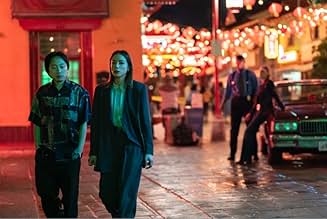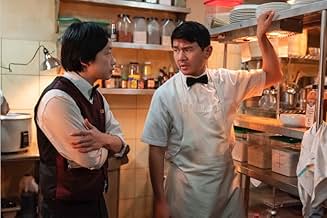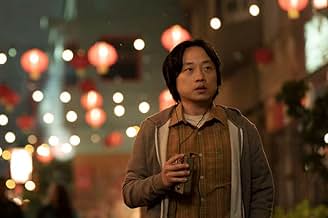Die Geschichte eines asiatisch-amerikanischen Schauspielers, der gegen klischeehafte Rollen und Stereotypen ankämpft, sowohl bei der Arbeit als auch in seinem Privatleben.Die Geschichte eines asiatisch-amerikanischen Schauspielers, der gegen klischeehafte Rollen und Stereotypen ankämpft, sowohl bei der Arbeit als auch in seinem Privatleben.Die Geschichte eines asiatisch-amerikanischen Schauspielers, der gegen klischeehafte Rollen und Stereotypen ankämpft, sowohl bei der Arbeit als auch in seinem Privatleben.
- Auszeichnungen
- 1 wins total
Folgen durchsuchen
Handlung
WUSSTEST DU SCHON:
- WissenswertesEarly in the series, Willis (Jimmy O. Yang), Fatty (Ronny Chieng), and Carl (Chau Long) see Detective Lana Lee (Chloe Bennet) on TV and debate her possible ethnicity: Carl declares, "she looks Thai," while Fatty argues, "Dude, she's clearly Korean. Know your Asians." In fact, Bennet is the child of a white mother and a Chinese father. Earlier in her acting career she changed her last name from Wang to Bennet (her father's first name) after encountering casting agents who said they were unable to cast her as Asian or Asian American characters, but her name precluded her consideration for white characters either.
Ausgewählte Rezension
Interior Chinatown is a brilliant yet understated reflection of the world-a mirror that exposes how society often judges people by their covers. The show captures this poignantly with the scene where Willis Wu can't get into the police precinct until he proves his worth by delivering food. It's a powerful metaphor: sometimes, if you don't fit the mold, you have to prove your value in the most degrading or unexpected ways just to get a foot in the door. The locked precinct doors represent barriers faced by those who don't match the "majority's" idea of what's acceptable or valuable.
While the series centers on the Asian and Pacific Islander (API) community and the stereotypical roles Hollywood has long relegated them to-background extras, kung fu fighters-it forces viewers to confront bigger questions. It makes you ask: Am I complicit in perpetuating these stereotypes? Am I limiting others-or even myself-by what I assume is their worth? It's not just about API representation; it's about how society as a whole undervalues anyone who doesn't fit neatly into its preferred narrative.
The show can feel confusing if you don't grasp its satirical lens upfront. But for me, knowing the context of Charles Yu's original book helped it click. The production team does an incredible job balancing satire with sincerity, blurring the line between real life and the exaggerated Hollywood "procedural" format. They cleverly use contrasting visuals and distinct camera work to draw you into different headspaces-Hollywood's glossy expectations versus the grittier reality of life.
Chloe Bennet's involvement (real name Chloe Wang) ties into the show's themes on a deeply personal level. She famously changed her last name to navigate Hollywood, caught in the impossible middle ground of not being "Asian enough" or "white enough" for casting directors. It's a decision that sparks debate-was it an act of survival, assimilation, or betrayal? But for Bennett, it was about carving a space for herself to pursue her dreams.
This theme echoes in one of the show's most poignant scenes, where Lana is told, "You will never completely understand. You're mixed." It's a crushing acknowledgment of the barriers that persist, even when you're trying to bridge divides. Lana's story highlights how identity can be both a strength and an obstacle, and the line serves as a painful reminder of the walls society creates-externally and internally.
Interior Chinatown doesn't just ask us to look at the system; it forces us to examine ourselves. Whether it's Willis Wu at the precinct door or Lana trying to connect in a world that sees her as neither this nor that, the show unflinchingly portrays the struggle to belong. And as viewers, it challenges us to question our role in those struggles: Are we helping to dismantle the barriers, or are we quietly reinforcing them?
While the series centers on the Asian and Pacific Islander (API) community and the stereotypical roles Hollywood has long relegated them to-background extras, kung fu fighters-it forces viewers to confront bigger questions. It makes you ask: Am I complicit in perpetuating these stereotypes? Am I limiting others-or even myself-by what I assume is their worth? It's not just about API representation; it's about how society as a whole undervalues anyone who doesn't fit neatly into its preferred narrative.
The show can feel confusing if you don't grasp its satirical lens upfront. But for me, knowing the context of Charles Yu's original book helped it click. The production team does an incredible job balancing satire with sincerity, blurring the line between real life and the exaggerated Hollywood "procedural" format. They cleverly use contrasting visuals and distinct camera work to draw you into different headspaces-Hollywood's glossy expectations versus the grittier reality of life.
Chloe Bennet's involvement (real name Chloe Wang) ties into the show's themes on a deeply personal level. She famously changed her last name to navigate Hollywood, caught in the impossible middle ground of not being "Asian enough" or "white enough" for casting directors. It's a decision that sparks debate-was it an act of survival, assimilation, or betrayal? But for Bennett, it was about carving a space for herself to pursue her dreams.
This theme echoes in one of the show's most poignant scenes, where Lana is told, "You will never completely understand. You're mixed." It's a crushing acknowledgment of the barriers that persist, even when you're trying to bridge divides. Lana's story highlights how identity can be both a strength and an obstacle, and the line serves as a painful reminder of the walls society creates-externally and internally.
Interior Chinatown doesn't just ask us to look at the system; it forces us to examine ourselves. Whether it's Willis Wu at the precinct door or Lana trying to connect in a world that sees her as neither this nor that, the show unflinchingly portrays the struggle to belong. And as viewers, it challenges us to question our role in those struggles: Are we helping to dismantle the barriers, or are we quietly reinforcing them?
- watchnrant
- 19. Nov. 2024
- Permalink
Top-Auswahl
Melde dich zum Bewerten an und greife auf die Watchlist für personalisierte Empfehlungen zu.
- How many seasons does Interior Chinatown have?Powered by Alexa
Details
- Erscheinungsdatum
- Herkunftsland
- Offizieller Standort
- Sprache
- Auch bekannt als
- 內景唐人街
- Drehorte
- Los Angeles, Kalifornien, USA(Location)
- Produktionsfirmen
- Weitere beteiligte Unternehmen bei IMDbPro anzeigen
- Farbe
- Sound-Mix
- Seitenverhältnis
- 16:9 HD
Zu dieser Seite beitragen
Bearbeitung vorschlagen oder fehlenden Inhalt hinzufügen

Oberste Lücke
What is the Canadian French language plot outline for Interior Chinatown (2024)?
Antwort






































